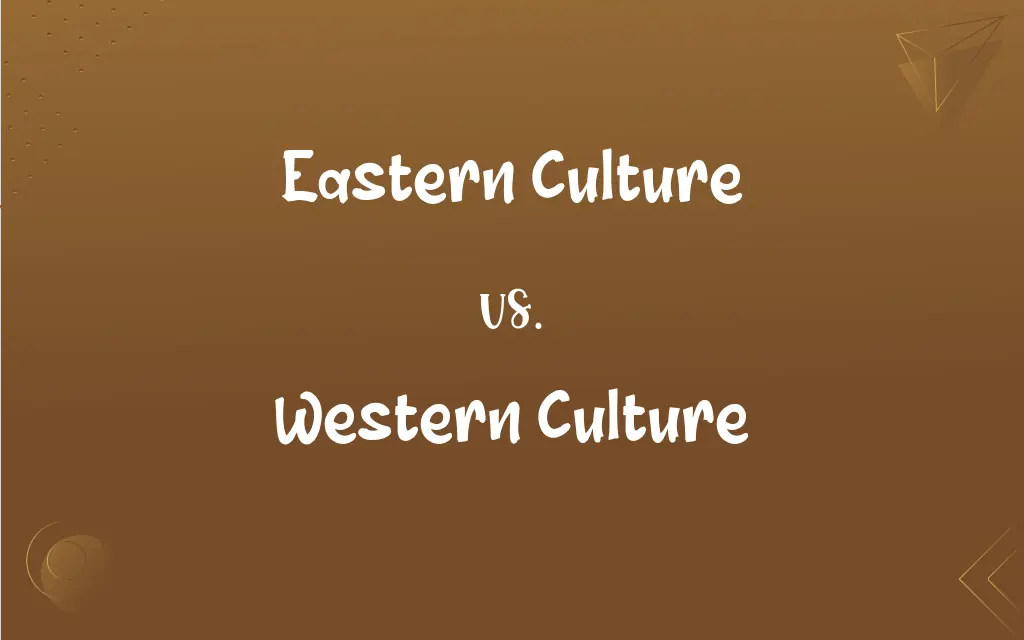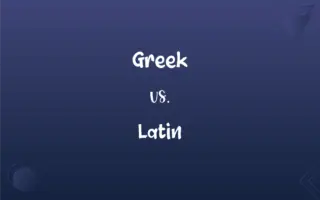Eastern Culture vs. Western Culture: What's the Difference?
Edited by Aimie Carlson || By Harlon Moss || Updated on October 4, 2023
Eastern culture generally emphasizes community, tradition, and spirituality, while western culture typically values individualism, innovation, and materialism.

Key Differences
Eastern culture often places importance on the collective and values familial and societal harmony. Western culture, on the other hand, predominantly emphasizes individual rights, freedoms, and personal achievements.
In the realm of eastern culture, traditions, customs, and rituals rooted in history are deeply revered, shaping many societal norms. In contrast, western culture often celebrates innovation, change, and progress, welcoming new ideas and practices.
Spirituality and philosophical contemplation play a significant role in eastern culture, leading to the rise of philosophies like Confucianism, Taoism, and Buddhism. Western culture has its roots in the Judeo-Christian tradition and the Enlightenment, placing a strong emphasis on logic, reason, and empirical evidence.
When looking at eastern culture, there's a notable preference for indirect communication, subtlety, and reading between the lines. On the other side, western culture typically appreciates directness, clarity, and explicit communication.
Eastern culture's approach to education often focuses on rote memorization and discipline, highlighting the student's responsibility to the teacher. Western culture usually emphasizes critical thinking, creativity, and fostering a sense of inquiry in the learning process.
ADVERTISEMENT
Comparison Chart
Value System
Collective and communal
Individualistic and personal
Tradition vs. Change
Deep respect for traditions
Embrace of change and innovation
Spiritual Roots
Philosophies like Confucianism, Taoism, Buddhism
Judeo-Christian tradition, Enlightenment
Communication Style
Indirect and subtle
Direct and explicit
Education Approach
Rote memorization and discipline
Critical thinking and creativity
ADVERTISEMENT
Eastern Culture and Western Culture Definitions
Eastern Culture
A societal framework emphasizing community, harmony, and tradition.
The emphasis on family reunions during Lunar New Year showcases the community-focused aspect of eastern culture.
Western Culture
A societal framework emphasizing individual rights, freedom, and innovation.
The American Dream epitomizes the aspiration for individual success in western culture.
Eastern Culture
Valuing indirect communication and subtlety.
In many eastern culture settings, it's preferable to imply a refusal rather than directly saying no.
Western Culture
Rooted in Judeo-Christian beliefs and the Enlightenment era's ideals.
The separation of church and state in many western countries reflects the Enlightenment's influence on western culture.
Eastern Culture
A blend of diverse traditions from Asia, emphasizing unity and balance.
The yin-yang symbol, representing balance, is a profound representation of eastern culture.
Western Culture
A blend of European traditions valuing progress and material success.
The rapid technological advancements in Silicon Valley demonstrate western culture's drive for innovation and progress.
Eastern Culture
Rooted in ancient philosophies and spiritual teachings.
Meditation practices, deeply ingrained in eastern culture, have their origins in ancient spiritual teachings.
Western Culture
Values direct communication and clarity.
In business negotiations, western culture typically appreciates straight-forward discussions and clear terms.
Eastern Culture
Reverence for ancestors and historical customs.
Ancestor worship in various forms is a significant element of eastern culture, honoring those who came before.
Western Culture
Emphasis on empirical evidence, logic, and reason.
The scientific method, integral to western culture, emphasizes observation and empirical evidence.
FAQs
How does religion influence eastern culture compared to western culture?
Eastern culture is shaped by philosophies like Buddhism and Taoism, while western culture is rooted in Judeo-Christian beliefs.
Do eastern culture and western culture have shared values?
Yes, both cultures can value family, ethics, and societal well-being, though they may manifest differently.
How do educational approaches differ between eastern culture and western culture?
Eastern culture emphasizes discipline and memorization, whereas western culture promotes critical thinking.
How do views on individual success differ between eastern culture and western culture?
Eastern culture sees success in terms of community and familial honor, while western culture focuses on personal achievement.
How are elders treated in eastern culture compared to western culture?
Elders are deeply revered in eastern culture, often living with family and consulted regularly, while in western culture, there's a mix, with some valuing independence over intergenerational living.
How do business ethics differ between eastern culture and western culture?
While both value ethics, eastern culture might prioritize relationship-building and harmony, while western culture emphasizes contracts and explicit terms.
Are communication styles significantly different in eastern culture and western culture?
Yes, eastern culture prefers indirect communication, while western culture values directness.
Do eastern culture and western culture have differing views on leadership?
Typically, eastern culture values leaders who maintain harmony, while western culture appreciates assertiveness and innovation in leadership.
Do eastern culture and western culture have different views on nature?
Eastern culture often sees humans as part of nature, emphasizing balance, while western culture has historically sought to understand and sometimes control nature.
Are family structures different in eastern culture compared to western culture?
Generally, eastern culture emphasizes extended family ties, while western culture focuses more on the nuclear family.
How do eastern culture and western culture view change and progress?
Eastern culture respects tradition, while western culture often seeks and celebrates change.
What are the roots of western culture's emphasis on logic and reason?
The Enlightenment era, promoting science and reason, greatly influenced western culture.
How does time perception differ in eastern culture versus western culture?
Eastern culture might view time cyclically, linked to nature and seasons, while western culture often sees it linearly, focusing on progress.
Can the lines between eastern culture and western culture be blurry?
Yes, due to globalization, cultures are constantly evolving and merging in various ways.
How does eastern culture approach societal harmony?
Eastern culture often values societal harmony over individual desires, promoting collective well-being.
How do festivals and celebrations differ between eastern culture and western culture?
Eastern festivals often honor seasons, ancestors, and traditions, while western ones might emphasize religious or national events.
How does art reflect the differences between eastern culture and western culture?
Eastern art often emphasizes balance and nature, while western art has diverse styles, often championing individual expression.
What's the fundamental difference between eastern culture and western culture?
Eastern culture values community and tradition, while western culture prioritizes individualism and innovation.
Can an individual be influenced by both eastern culture and western culture?
Absolutely, globalization and migration have led to blended cultural influences.
Can elements of eastern culture be found in western societies, and vice versa?
Yes, cultural exchange over centuries has led to shared elements and influences.
About Author
Written by
Harlon MossHarlon is a seasoned quality moderator and accomplished content writer for Difference Wiki. An alumnus of the prestigious University of California, he earned his degree in Computer Science. Leveraging his academic background, Harlon brings a meticulous and informed perspective to his work, ensuring content accuracy and excellence.
Edited by
Aimie CarlsonAimie Carlson, holding a master's degree in English literature, is a fervent English language enthusiast. She lends her writing talents to Difference Wiki, a prominent website that specializes in comparisons, offering readers insightful analyses that both captivate and inform.































































